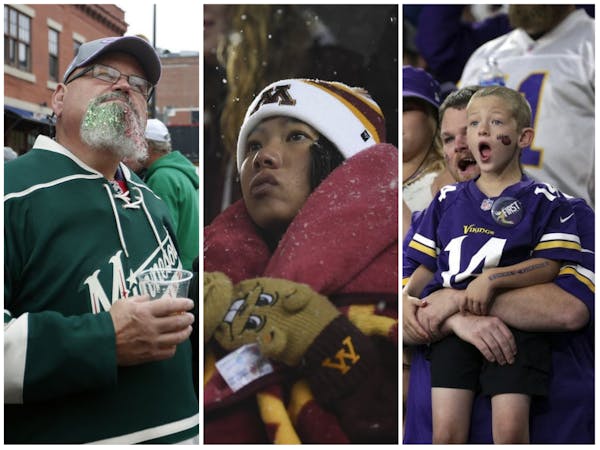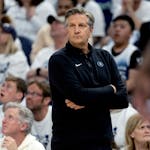 See
more of the story
See
more of the story
The NBA provides a higher standard for success and offers more extreme examples of terrible than will be found in North America's other three primary men's professional team sports.
The reason for this is mathematical. An NHL team getting to four goals is going to win 90% of the time. A major league baseball team getting to five runs is going to win 85% of the time. An NFL team that scores three touchdowns, kicks a couple of field goals and scores 27 points is going to win 75% of the time.
NBA teams are now playing to 115 points to get a victory. The winners are going to need 40-some field goals, twos or threes, to get there.
It has been an annual ritual when the "winter sports," the NHL and the NBA, get to mid-April and start conducting playoffs:
The seedings get twisted upside down in the first couple of rounds of the NHL tournament. Almost never do we get a major upset in the first two rounds of the NBA playoffs.
You can analyze this extensively, but it's simple: When you play to four goals (or three in the playoffs), the team with the best players is one late-in-game carom from getting beat. When you play to 40 field goals, it is unlikely the best team is going to be done in by caroms often enough to lose four times in seven games.
Simply reaching the playoffs creates possibilities in hockey, football and baseball (insert your Twins one-liner here). That's not the case in the NBA.
Squeezing into the bottom of the playoffs is such a no-hope situation in the NBA that the Timberwolves have done so once since 2004, and we're still mad at the coach for getting them there.
Tom Thibodeau was also the president of basketball operations and made a trade for Jimmy Butler in June 2017, for the purpose of ending the playoff drought.
The Wolves went 47-35 and had 16 sellouts during the regular season. The record was good only for the No. 8 seed in the rugged West that spring.
Predictably, the Wolves lost in five games to top-seeded Houston, and 8½ months later, Thibodeau was fired. Now the lament over Thibs' playoff focus has reached new heights, with Zach LaVine — a key piece in the Butler trade — having made himself an All-Star with Chicago.
There are two categories of NBA teams: the "haves," of which there are never more than six or seven, and the "always building," with only dreams of future glory.
It's the decisions made by star players that eventually decide how long an outlier can pop up and remain among the haves. This goes back to Kareem Abdul-Jabbar, when he forced a trade out of Milwaukee in 1975 after his sixth season with the Bucks.
Kareem went to the Lakers and won five titles, to go with the one he had won with Oscar Robertson in Milwaukee in 1971.
The dictation of where championships would occur in the NBA reached a new level in 2010, when LeBron James formed an All-Star team with Dwyane Wade and Chris Bosh in Miami.
James Harden, Kyrie Irving and Kevin Durant now have trumped all previous All-Star efforts with the Brooklyn Nets.
Here in Minnesota, the woebegone Wolves must sacrifice all to keep Karl-Anthony Towns from demanding his departure — a hope almost against hope that Minnesota will remain worthy of being the place for KAT to earn his $31.65 million in 2021-22, $33.8 million in 2022-23 and $36 million in 2023-24.
Nobody has made a better read of the NBA's trophy room in recent times than did Masai Ujiri, the president of the Toronto Raptors, in the summer of 2018.
The Raptors were 59-23 in 2017-18, the best record in the East, yet they were swept by LeBron and Cleveland in the second round.
Ujiri decided to take his shot. He made a trade for Kawhi Leonard, the discontented superstar in San Antonio. Kawhi had played only nine games for the Spurs the previous season, and had one year left on his contract.
Yet, Ujiri knew Toronto wasn't a place that superstars would choose to assemble to present a championship. For Ujiri, this was the NBA version of one-and-done, and thanks to Kawhi, and also injuries that struck Golden State, the Raptors got their championship.
Kawhi left for Los Angeles the following July — although for the Clippers, not the Lakers — but however briefly, Ujiri beat the NBA's current system of superstars choosing up sides to decide titles.
So now we bring in another coach to the Wolves, and again vow to build around KAT, and look for those other pieces — although "D-Lo" might not qualify.
And to what end?
To perhaps reach a best-of-seven playoff series? The Wolves tried that three years ago and we're still mad.
It's cold and depressing down here as a lowly member of the ABA — the Always Building Association — but it seems to be our destiny in North America's most unforgiving sports league.
If only games were played to four, not 115, there'd be more hope.
Write to Patrick Reusse by e-mailing sports@startribune.com and including his name in the subject line.






